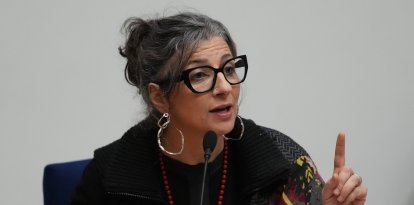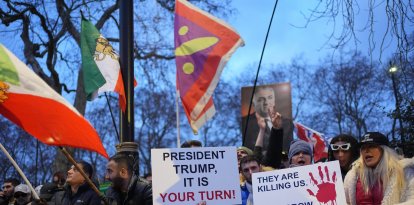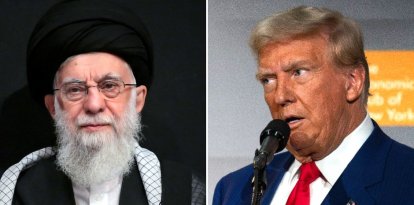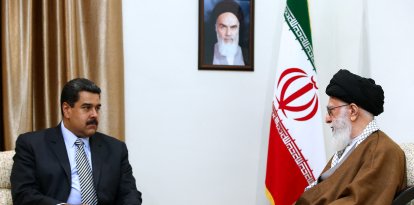Who Really Denied Statehood to the Palestinian People?
It is not correct to claim that Israel denied the Palestinians statehood. The Palestinian leadership did.

Lord William Peel and Sir Horace Rumbold, of the Palestine Royal Commission
One of the most pervasive myths of the Palestinian protest movement is that Israel has denied statehood to the Palestinian people. To the contrary, Israel agreed to Palestinian statehood in 1937-1938, 1947-1948, 1967, 2000-2001, and 2007. In each case, it was the Palestinian leadership that refused to agree to the two-state solution that would have created a Palestinian state, alongside a state for Jewish inhabitants.
The Peel Commission Report
In 1937 – in the midst of the terrorist revolt inspired by Adolf Hitler's ally, Hajj Amin al-Husseini, the Grand Mufti of Jerusalem – the British published the Palestine Royal Commission Report (also known as the Peel Commission Report).
The Commission recommended a partition plan by which to resolve what it characterized as "irrepressible conflict... between two national communities within the narrow bounds of one small country." Because of the general hostility and hatred of the Jews by the Muslims, "national assimilation between Arabs and Jews is... ruled out." Nor could the Jews be expected to accept Muslim rule over them, especially since Husseini made it clear that most of the Jews would be transferred out of Palestine if the Muslims gained complete control. The Peel Commission concluded that partition was the only solution.
The Peel Commission plan proposed a Jewish state in areas in which there was a clear Jewish majority. Divided into two non-contiguous sections, the northern portion extended from Tel Aviv to the current border with Lebanon. It consisted largely of a 10-mile-wide strip of land from the Mediterranean east to the end of the coastal plain, then a somewhat wide area from Haifa to the Sea of Galilee. A southern portion, disconnected from the northern one by a British controlled area that included Jerusalem, with its majority Jewish population, extended from South Jaffa to north of Gaza.
The proposed Arab state was, on the other hand, entirely contiguous and encompassed the entire Negev, the West Bank, and the Gaza Strip. It was several times larger than the proposed Jewish state. The population of the proposed Jewish state would have included 300,000 Jews and 190,000 Arabs. Another 75,000 Jews lived in Jerusalem, which would have remained under British control.
The Commission also alluded to how partition would help the rescue of Europe's Jews from Nazism.
The Jews accepted the Peel partition plan, while the Arabs categorically rejected it, demanding that all of Palestine be placed under Arab control and that most of the Jewish population of Palestine be "transferred" — ethnically cleansed — out of the country, because "this country [cannot] assimilate the Jews now in the country." The Peel Commission implicitly recognized that it was not so much that the Arabs wanted self-determination as that they did not want the Jews to have self-determination or sovereignty over the land the Jews themselves had cultivated and in which they were a majority.
The Arabs of Palestine wanted to be part of Syria and be ruled over by a distant monarch. They simply could not abide the reality that the Jews of Palestine had created for themselves a democratic homeland pursuant to the League of Nations mandate and binding international law. Even if turning down the Peel proposal resulted in no state for the Arabs, that was preferable to allowing even a tiny, non-contiguous state for the Jews.
A history of rejections
Following the end of World War II, the United Nations also recommended partition of the area into two states -- one for the Arab population, the other for the Jewish population. Once again, the Arab leadership rejected the two-state solution, while the Jewish leadership accepted it. The Jewish leadership declared statehood in the area allocated to it by the UN. The Arab leadership responded by declaring a genocidal war against the new state of the Jewish people. They did not want a Palestinian state. And they wanted there to be no Jewish state.
As soon as Israel declared its independence, Egypt, Jordan, Syria, Iraq, and Lebanon invaded it, with help from Saudi Arabia, Yemen, and Libya. Arab armies, with the help of local Arab terrorists, determined to destroy the new Jewish state and exterminate its population.
After the Six Day War of 1967, which resulted in Israel capturing the West Bank, Gaza Strip, and east Jerusalem, Israel signaled its willingness to negotiate land for peace. However, the Arab League met in Khartoum and issued the famous "Three No's": no peace with Israel, no recognition of Israel, and no negotiations with Israel. This led Israel's ambassador to the United Nations, Abba Eban, to equip: "I think that this is the first war in history that has ended with the victors suing for peace and the vanquished calling for unconditional surrender."
According to former US President Bill Clinton, the Israelis, in 2000-2001, offered to withdraw from approximately 96% of the West Bank and 100% of the Gaza Strip in exchange for peace. The Palestinians were offered large land swaps from Israel in exchange for the small amount of land that would remain under Israeli control. Palestinian Authority President Yasser Arafat rejected that offer and -- presumably to change the subject and deflect the blame -- initiated a wave of terrorist attacks that left thousands dead.
In 2007, Israeli Prime Minister Ehud Olmert offered an even better deal. Once again, the Palestinian leadership did not accept the offer. As one Israeli leader put it, "The Palestinians don't know how to take yes for an answer."
Denying Israel's right to exist
It is therefore not correct to claim that Israel denied the Palestinians statehood. The Palestinian leadership did.
The Palestinians may deserve to have a peaceful state, but their claim is no greater than that of the Tibetans, the Kurds, the Chechens, and other stateless groups. These other groups, unlike the Palestinians, have never even been offered statehood, let alone repeatedly turned it down.
No one, therefore, should believe that it was Israel that has made the Palestinian people stateless. It was the Palestinians themselves, through their anti-Jewish leadership. The current anti-Israel protesters in the West are not calling for a Palestinian state living in peace alongside Israel. They, like the failed Palestinian leadership, just wants to end Israel's existence. It is not going to happen. Until the Palestinians recognize this reality, they will be denying themselves any possibility of statehood.



























